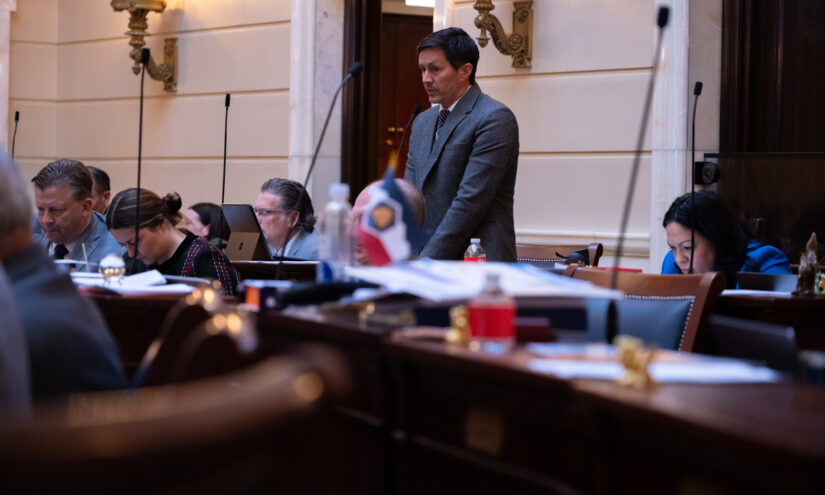Get stories like this delivered straight to your inbox. Sign up for The 74 Newsletter
Utah teachers unions are reeling after a bill that would bar them from bargaining collectively and conducting operations on school property was forwarded to the governor’s desk Feb. 6.
Lawmakers who favor the measure, HB267, say it was introduced to ensure transparency in public-sector unions and protect taxpayer resources, but educators say it will only make a job that’s already full of challenges more difficult.
While it doesn’t prevent employees from joining a union, the bill prohibits public agencies — which employ teachers, firefighters, police officers and county workers, among others — from “recognizing a labor organization as a bargaining agent” and “entering into collective bargaining contracts.”
The bill’s state Senate co-sponsor, Republican Kirk Cullimore, argued during a Feb. 6 legislative session that “unions are negotiating against what could be seen as the taxpayer sometimes.” At that same meeting, Republican state Sen. John Johnson said collective bargaining can undermine the public interest.
“Public-sector unions, unlike their private counterparts, negotiate with government officials over taxpayer-funded resources,” he said. “This dynamic can lead to decisions that prioritize union interest over the needs and welfare of the general populace.”
Other lawmakers who support HB267 said it ensures that unions operate with transparency and fairness.
But some opponents of the bill, including educators and legislators, charge it was created to retaliate against the Utah Education Association, which is challenging the constitutionality of Utah’s school voucher program in court. The association is the state’s largest teachers union, with 18,000 members.
In a Jan. 25 livestreamed discussion, Republican state Sen. Todd Weiler called the measure a “knee-jerk reaction” to the legislature’s frustration with the union.
“Because we can’t constitutionally pass a bill that just punishes the UEA, we’re including firefighters and other unions that didn’t necessarily draw the ire of the legislature,” Weiler said. “I don’t think our best policy directives are achieved if we’re trying to be vindictive or reactive to something.”
Like most of Utah’s teachers unions, Canyons Education Association in Salt Lake County doesn’t engage in collective bargaining. But President Krista Pippin said the chapter regularly negotiates with the district for improved policies and working conditions.
“The school board administration didn’t support [the bill]. The superintendents association did not support it, because they all know the importance of advocacy work that is so essential to the profession,” Pippin said.
Lawmakers who support HB267 have said unions could still advocate for their interests under the bill, but opposing senators and Utah’s largest teachers union disagree.
State Senate Minority Leader Luz Escamilla said the measure will have a lot of unintended consequences.
“Our first responders, our teachers, are doing probably the most difficult jobs that we have right now,” Escamilla said. “Their ability to feel protected and have representation in conversations … they are not going to be able to do it individually with their management. That is just impossible.”
The Utah Education Association said on its website that HB267 will weaken advocacy because it cuts off access to schools, making it harder for unions to do their work.
The bill would bar unions from using public property for free. Members would have to pay to use their school space or rent another public location for union activity.
Jenny Graviet, president of Weber Education Association, said she would no longer be able to visit schools during lunch to collect teacher opinions or meet with district administrators to discuss union priorities.
“I do a lot in the evening, but when I talk to members, then I have to catch them during their lunchtime. But I’m still using the building,” Graviet said. “Which means I’m not going to be listening to voices.”
Under the bill, collective bargaining contracts that are in place by May would remain in force until they expire. The union in Weber, located north of Salt Lake City, is one of the few in Utah that does engage in collective bargaining to secure teacher contracts.
Now, the chapter will have to act quickly to finalize a multi-year contract with the district and get it ratified by the school board by the May deadline.
“We’re going to have to just cut off the ideas that we were hoping to do,” Graviet said. “For example, special education teachers had reached out to me, begging for more time because they’ve got to get caught up on their caseloads.”
Graviet said she’s already losing members because educators are getting misinformation about the bill, thinking it will outlaw teachers unions.
“If we have reduced membership, we cannot pay for things … in the end, you get a very weakened union,” she said. “When you have weakened locals, you have a weakened state who can’t work on legislation, who can’t advocate on our behalf. It kind of makes me sad.”
Get stories like these delivered straight to your inbox. Sign up for The 74 Newsletter








